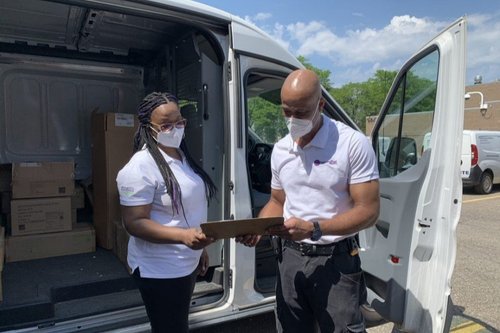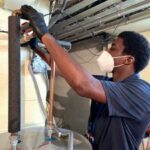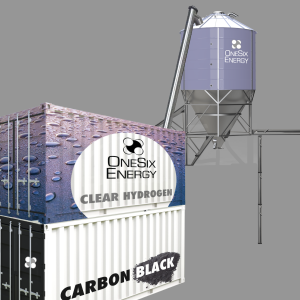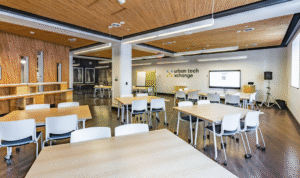
- Kim Kisner
- Business
- 07/27/2022
Dr. Brandy Brown, Chief Innovation Officer is Leading the Charge for Energy Efficiency in Detroit

SBN Detroit interviewed Dr. Brandy Brown, Chief Innovation Officer of Walker-Miller Energy Services, a Detroit-based energy efficiency company focused on equity in the clean energy economy, on her role in guiding the development of advanced energy projects, workforce development, and equitable mobility solutions.
Prior to joining Walker-Miller, Dr. Brown served as Climate & Energy Advisor within the Michigan Department of Environment, Great Lakes & Energy. Additionally, Dr. Brown serves as part of the Environmental Justice faculty for the University of Michigan’s School for Environment and Sustainability and as an appointee to Michigan’s National Resources Trust Fund Board.
Q: You recently took on the position of Chief Innovation Officer at Walker-Miller, which is a new role for the company. What is involved in this?
A: It’s so much fun I can’t believe I get paid to do it! Every day the work we are doing here is positively impacting the Walker-Miller team, the Detroit community, and beyond.
Tangibly, this role comes with two main tenets;
The first is thought leadership focused on the issues we need to overcome to achieve an equitable

clean energy economy. This involves pushing topics and asking hard questions while coaching with love. It also involves asking folks to understand the impact of what they are doing so we don’t create the same inequalities that we’ve created for the last 100 years. It’s also about asking people to be cognizant of what structures exist now, what we are rolling out into the future, and thinking about the distribution, meaning will everyone benefit, and who’s going to bear any potential burdens?
The second is talking to business leaders and people in the policy world to make sure that the new services being made available are inclusive and equitable for all. We constantly need to ask ourselves, does this product work in a home in a marginalized community? Also, are we talking to anyone in the communities themselves to share awareness of solutions coming down the pipeline?
Often awareness is not being built at the time we are rolling out new solutions and technology, and that’s a misstep.
I am actually a good example here. Fifteen years ago, I did not have the means to make changes to my home to increase its efficiency. But since I was working within the energy community I was aware of innovations and that awareness allowed me to plan and prepare my home for these changes. We need to intentionally communicate with all communities.
Q: What immediate goals have you identified for Walker-Miller and what are you currently working on?
A: I’m focused on the company internally and where I can provide support to the team and act as a bridge-builder to connect this team to my network. I’m following Carla Walker-Miller here, as she does this so naturally.
I’m also working to identify impactful strategies we can roll out in the next year or two. To date, we’ve launched two.
The first is Equitable Mobility Consulting. As electric vehicles become a more common mode of vehicular transportation, we are seeing more requests for EV infrastructure such as planning around where charging is going, and where vehicles may live. A lot of the work that follows falls in what I call prosperity zones where people can afford such things. We need to think about equity down the line.
So, we’ve developed this consulting to point folks in the right direction when planning infrastructure. We are also involved in electric vehicle supply equipment (EVSE) installations and supporting communities on how to be intentional and mindful as they are planning.
Second, we’ve created an Equitable Research and Consulting area of our business. This is an internal group that is operationalizing equity with energy efficiency programs and helping companies think about how to track and measure it.
A big aha moment for us was realizing that equity is context-dependent. Meaning that it’s constantly changing, therefore we can’t just measure once. We have to listen to the community and their needs on a continuum because it’s fluid.
Q: What are your longer-term goals at Walker-Miller?
A: A large focus for us now and in the future is the equitable distribution of wealth creation. When we think of equity and the benefits of clean energy and clean energy transformation, we have to recognize that this shift is opening doors to wealth creation.
And it’s difficult to ensure the equitable distribution of wealth creation. Walker Miller is approaching this by identifying business creation. Meaning that we are recruiting small and diverse businesses and giving them opportunities to become powerful in this space. This is very much a forward-thinking view. The steps we take now will reap great benefits ten years down the road.
Q: What are other challenges you face?
A: There is not enough time in a day. From sun up to sun down, there is so much to do and so many conversations to have. But that’s what makes it exciting.
I think we have an opportunity in front of us to make a more concerted effort in working together.

We can no longer look at our communities and think, this person will handle HVAC and this program will handle windows and that person will handle EV. We all have to be working together and we also all have to understand the process – what needs to be done first. You can give a home clean energy but if it’s not weatherized it’s an exercise in futility.
Ben Dueweke, Walker-Miller’s Director of Community Partnerships is a master at this. He excels at setting up programs and the pipeline, getting residents fully weatherized, and then getting them into more clean energy. We are focusing on a few houses and a few blocks at a time with the goal to ultimately transform the city.
Q: What drives your passion here?
A: When I had my first child, and then my second, and then became a single mother with limited income and was faced with getting my life together to support my family, I kept thinking, how are we not addressing these other big issues in communities and the state and society? I became very focused on ‘let’s make this better.’
I was taught to think in terms of generations. I have a responsibility within my family to do something now to impact my children. And in 150 years from now, I hope this impact is still reverberating.
Q: What advice would you give others in business looking to start sustainability efforts?
A: Refrain from thinking about what you can’t do. When I talk to folks in businesses about sustainability they tend to first think about parameters and that limits us. Yes, we have to be aware of the rules and regulations but there are other means of power.
Also, I would advise to always be cognizant of what the current experience of the community is… look around and look for what impact you can make.
If we are doing these two things, we can come up with new ideas. This continual ideation, innovation, being open and sharing will help us come up with solutions.
Q: From your perspective, what role do Detroit businesses in play in terms of sustainability?
A: The Detroit business community has an extremely strong voice. I think the role is a supportive one. Listening to what the city needs and what communities need is paramount and there may be initiatives and programs that can bridge the gaps. I think businesses have to be an active partner in supporting what the city needs and wants.
Q: What Detroit businesses do you think are doing it well?
A: First Dunamis Clean Energy Partners, LLC run by Natalie King. This is a certified green energy firm specializing in Electric Vehicle Charger and LED lighting manufacturing; energy efficiency and energy management services; and environmental service solutions for municipal, commercial and industrial clients.
I’m also a big fan of Our Next Energy (ONE). Not only are they focused on a particular technological advancement and doing that work but they are active in calling to action other people in the space. They are massive collaborators with the mantra of ‘hey this is a big job, let’s do it together.’ I admire that.
Kim Kisner
- All
- Business
- Community
- Education
- Events

Eastern Market Partnership, in collaboration with the City of Detroit’s Office of Sustainability Urban Agriculture Division, has announced $240,000 in grant funding to support Detroit-based farmers and farmer collectives. The grants will advance food access, climate education, sustainable land use, and economic opportunity, with priority given to Black- and Indigenous-led farms, youth-led initiatives, and projects rooted in historically disinvested neighborhoods. The recipients – ranging from cooperatives and community...

Citizen Robotics is a Detroit-based nonprofit that advances the use of robotics and digital manufacturing in residential construction, focusing on improving productivity, sustainability, and long-term affordability. Best known for its early work in 3D-printed housing, it explores how alternative construction methods and new financial models can reduce material waste, lower lifetime operating costs, and enhance the resilience of homes. SBN Detroit interviewed Tom Woodman, founder and president of...

Detroit-based OneSix Energy is a clean-energy technology company focused on advancing a lower-carbon approach to hydrogen production. Headquartered at Newlab in Detroit, the startup is developing a proprietary methane pyrolysis system designed to produce hydrogen without carbon dioxide emissions, while also generating solid carbon as a co-product. SBN Detroit interviewed with cofounder Stefan Sysko about the company’s origins, its approach to hydrogen production, and why Detroit is positioned...







